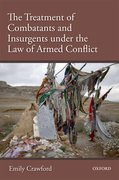This book makes the case for eliminating the distinction between types of armed conflict under international humanitarian law (IHL), specifically as they apply to persons taking a direct part in the hostilities - be they soldiers or insurgents. Currently, IHL makes a distinction between international and non-international armed conflicts. International armed conflicts are regulated by more treaties than their non-international counterparts. The regulation of international armed conflicts is also considerably more comprehensive than that offered for participants in and victims of non-international armed conflicts.
This bifurcation of the law was logical at the time the Geneva Conventions of 1949 were drafted and adopted, as the majority of armed conflicts prior to that point had been international in character. However, in the years following the adoption of the Conventions, there has been a proliferation of non-international armed conflicts, which presents challenges to a body of law that has few tools to adequately address such occurrences. The adoption of the Additional Protocols in 1977 went some way to addressing the legal lacunae that existed, but significant gaps still remain.
Mindful of this history, this book tracks the growth and evolution of the laws of armed conflict in the modern era, since the first document of the laws of war produced for the American Civil War. In doing so, this book demonstrates how the law of armed conflict has become increasingly harmonised in its application, with more rules of IHL being generally applicable in all instances of armed conflict, regardless of characterisation.
This book then makes the argument that the time has come for the final step to be taken, the elimination of the distinction between types of armed conflict, and the complete harmonisation of the laws of war. Focusing specifically on the issue of combatants and POWs in armed conflicts, and drawing on the recent US treatment of detainees in Guantanamo Bay in the "War on Terror", this book draws on considerable legal precedent, legal theory, and policy arguments to make the case that it is time for the law relating to the regulation of armed conflicts to be more uniformly applied.
Introduction
1: The Evolution of Armed Conflict in the Twentieth Century and the International Legal Response - Towards Convergence
2: Combatant Status and Prisoner of War Protections
3: Existing Protections for Participants in Non-International Armed Conflict
4: Completing the Picture: International Human Rights Law in Non-International Armed Conflicts
5: Achieving a Universal Combatant Status
Conclusions
Bibliography
Index
1: The Evolution of Armed Conflict in the Twentieth Century and the International Legal Response - Towards Convergence
2: Combatant Status and Prisoner of War Protections
3: Existing Protections for Participants in Non-International Armed Conflict
4: Completing the Picture: International Human Rights Law in Non-International Armed Conflicts
5: Achieving a Universal Combatant Status
Conclusions
Bibliography
Index

Emily CRAWFORD, The Treatment of Combatants and Insurgents under the Law of Armed Conflict, Oxford, Oxford University Press, 2010 (240 pp.)
Emily Crawford, Research Fellow, Gilbert & Tobin Centre of Public Law at the University of New South Wales. Dr Emily Crawford is a Visiting Fellow at the University of New South Wales, in Sydney, Australia, where she teaches International Law and International Humanitarian Law. She has a Bachelor of Arts and Bachelor of Laws degree, and completed her Doctoral Thesis at the University of New South Wales on the differing levels of treatment afforded to participants in armed conflicts. Her research interests are international humanitarian law and international criminal law.
Aucun commentaire :
Enregistrer un commentaire